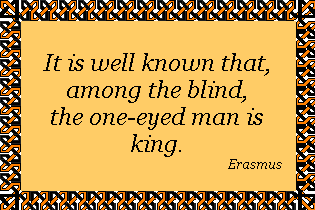|
."Pity my Simplicity"
"...the simple teachings of the Jesusonian gospel: sonship with God, brotherhood with man, and ever-ascending citizenship in the eternal universe." (1038)
The key to this "simple" doctrine is the very nature of God as it was revealed in the life of Jesus of Nazareth. This nature was most effectively revealed in Jesus' parables, in particular, in these:
The prodigal son
The lost sheep
The lost coin
The widow's mite
The workers in the vineyard
The father who would not give his son a stone when he asked for bread.
In all of these, and elsewhere, Jesus revealed a God who contrasted strongly with the God of his people. In Jesus' day, Yahweh was a tribal God who rewarded the tribe for obedience, punished their disobedience, and, when it suited him, delivered them from their enemies.
The God revealed in the life of Jesus was a God of infinite love, compassion, and mercy, one who was also God to the prostitute, the Samaritan, the tax-collector, and even the simple-minded. If we can imagine a perfect earthly father, then the heavenly Father revealed by Jesus was: infinitely more loving, infinitely more merciful, infinitely more wise, infinitely more just, and infinitely greater in all respects than any we can imagine.
The Jesusonian gospel included sonship with God and ascending citizenship in the eternal universe. In its modern context, sonship with God means membership in the family of God on earth. Nowhere is its meaning given a higher degree of reality than in that component of the story of Jesus life on earth when he undertakes the "father-role" to his Nazareth family following after the untimely death of his earthly father, Joseph.
The meaning of "ever-ascending citizenship in the eternal universe" entails a spiritualization of our very being and nowhere is its meaning better illustrated as a possibility for mere mortals than in the story of Jesus' life from his birth to his baptism in the Jordan.
Up until his baptism, Jesus lived exactly as do all other humans since the bestowal of his Spirit of Truth at Pentecost--a life in which he had to tread his own pathway of discovery to the meaning of God's centrality in the unfolding of his individuality.
However all of us who are fortunate enough to have found The Urantia Book, and have been blessed by having minds in which our previous experiences of earthly living have not shut us off from exploring its content, all such have an enormous advantage over the babe of Bethlehem who had to make his discoveries without this help. And to help us to understand even better, we are given Jesus' Spirit of Truth.
If we see ourselves as chosen people, in some way being rewarded as special by God, we may have missed the point. By our knowing of the content of the Urantia Papers, we have dismissed any possible claim to be numbered with the ignorant who demonstrate that redeeming "faintest flicker of faith." By stint of the knowledge with which we have been blessed, far more is required from us. Apparently simplicity has its rewards.
|
|



